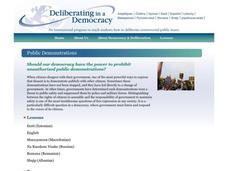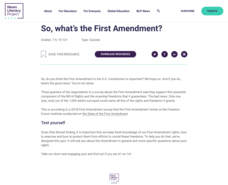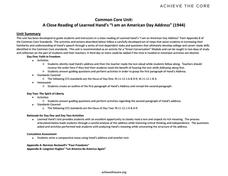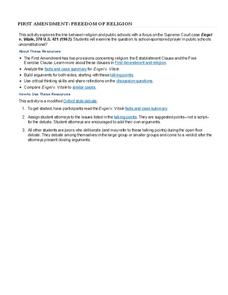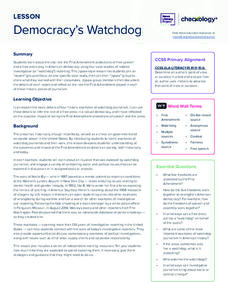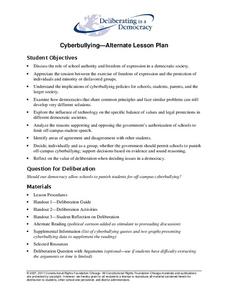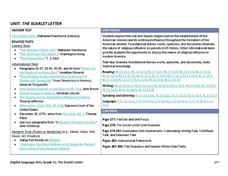Deliberating in a Democracy
Public Demonstrations
Have you ever fought publicly for an idea you believe in? Scholars research and analyze the right to demonstrate peacefully. Incorporating different real-life scenarios as well as legal decisions exposes the concept of democracy and free...
Library of Virginia
Antebellum Freedom
From indentured servitude to involuntary race-based servitude, slavery has taken many forms in American history. Class members examine three manumission petitions that reveal how the rights of African Americans and African American...
National Woman's History Museum
Introduction to Activism
Activist, feminist, and labor organizer Dolores Huerta are perhaps best known for her work with Cesar Chavez to create the United Farm Workers. Class members explore primary source documents to learn more about this Medal of Freedom winner.
News Literacy Project
So, What’s the First Amendment?
The First Amendment to the US Constitution protects people's rights to speech, the press, and religion. Using the resource, scholars discover how. They take a brief online quiz to determine how well they understand the First Amendment.
National Endowment for the Humanities
Oyez! Oyez! Oyez!: Simulating the Supreme Court
Students have freedom of speech—or do they? Using an actual court case and research materials on the Supreme Court, young legal scholars examine the Supreme Court's role and history. Then, they argue a case the court declined to hear and...
Reading Through History
The March on Washington
How does marching get a point across to the government? Teach pupils about civics, human rights, and freedom of speech using the resource about the March on Washington. After reading, learners complete multiple-choice and short-answer...
Judicial Learning Center
The Constitution and Rights
What's the right way to teach young historians about the Bill of Rights? Many an instructor has asked this question when pondering lesson plans over the US Constitution. The Constitution and Rights is a nifty resource that provides a...
Curated OER
A Close Reading of Learned Hand's "I Am an American Day"
Judge Learned Hand's "Spirit of Liberty" speech delivered during the July, 1944 "I Am an American Day" celebration is the subject of a close reading activity that models for learners how to approach a dense, difficult text.
Carolina K-12
Public Christmas Displays and Lynch v. Donnelly
Does a Christmas display on government property violate the Constitution? Learners study the Establishment Clause of the First Amendment and learn about the landmark Supreme Court case Lynch v. Donnelly through watching a documentary and...
K20 LEARN
To Ban or Not to Ban? Intellectual Rights and Responsibilities: Banned Books, Censorship Part 2
After examining different perspectives on book banning, scholars select a book from a list of frequently banned books and research the controversies surrounding it. They then craft an argument about their chosen book, including arguments...
Administrative Office of the US Courts
Engel v. Vitale
"Is school-sponsored prayer in public schools unconstitutional?" That is the question teams debate as they consider the arguments presented to the Supreme Court in Engel v. Vitale. The attorneys study the provided talking points and...
News Literacy Project
Democracy’s Watchdog
As part of a study of the importance of the First Amendment, expert groups research different historic case studies of investigative reporting, and then the experts share their findings with jigsaw groups. The case studies include Nellie...
Constitutional Rights Foundation
Elections, Money, and the First Amendment
Those who spend the most, win. Academics read informational text, participate in group discussion, and defend campaign reforms to understand the correlation between money, the First Amendment, and election results. The resource explains...
PBS
Civic Engagement and How Students Can Get Involved
There is no age limit on civic engagement. Even if your pupils are not old enough to vote, they are old enough to get involved. Show them how with a PBS instructional activity that underscores the importance of civic participation and...
K20 LEARN
Trigger Warnings - Intellectual Rights and Responsibilities: Banned Books, Censorship Part 1
"Warning: Conducting this lesson may be harmful." Such statements, called "Trigger Warnings," are the focus of a two-part lesson that looks at censorship, especially the pros and cons of trigger warnings. Class members read two articles,...
Deliberating in a Democracy
Cyberbullying—Alternate Lesson Plan
Should schools be permitted to punish young scholars for off-campus cyberbullying? After reading a passage that details statistics about cyberbullying and Supreme Court rulings about schools' ability to limit student speech, class...
Reading Through History
The Emancipation Proclamation
The Emancipation Proclamation: one of the most important primary sources for studying American history! An interdisciplinary resource includes a reading of Abraham Lincoln's seminal speech quoted directly. Following the reading, pupils...
Museum of Tolerance
The Price of Personal Responsibility
A reading of Patrick Henry's "Speech in the Virginia Convention," Henry David Thoreau's "Civil Disobedience," and Rev. Martin Luther King, Jr.'s "Letter from Birmingham Jail" launch a discussion about the price one is willing to pay to...
Stanford University
Lesson Plan: Montgomery Bus Boycott
Most of us have heard of Rosa Parks, the Montgomery Bus Boycott, and Martin Luther King, Jr. But what about Claudette Colvin, Virginia Durr, Freedom Summer, or the Birmingham Children's Crusade? A five-lesson unit prompts class members...
Judicial Learning Center
State Courts vs. Federal Courts
Popular culture often portrays the Feds as the most fearsome of law enforcement agencies. Yet, someone charged with a crime is considerably more likely to end up in a state court. The lesson, one of six covering the Organization of the...
Humanities Texas
A President's Vision: Abraham Lincoln
Invite your learners to take a close look at Abraham Lincoln's presidency through analysis worksheets of several images and primary documents, presented on an educational poster entirely dedicated to this great United States president.
Library of Congress
The Emancipation Proclamation and the Thirteenth Amendment
How did the Emancipation Proclamation lead to the Thirteenth Amendment? Middle schoolers analyze primary source documents including the text of the Emancipation Proclamation, political cartoons, photographs, and prints to understand the...
Louisiana Department of Education
The Scarlet Letter
Use Nathanial Hawthorne's immortal text on the influence of religion on the early American settlements, as well as its continued impact on American culture, with a unit that focuses on The Scarlet Letter. In addition to Hawthorne's...
PBS
March on Washington: A Time for Change
Young historians conclude their study of the events that lead up to and the planning for the March on Washington. After examining videos and primary source documents, they consider the civil rights objectives that still need to be...
Other popular searches
- Journalism Freedom of Speech
- Censorship Freedom of Speech
- Freedom of Speech Obama
- Canadian Freedom of Speech
- Freedom of Speech Music
- Freedom of Speech Readings
- Limited Freedom of Speech
- Freedom of Speech Abm
- Freedom of Speech and Press


